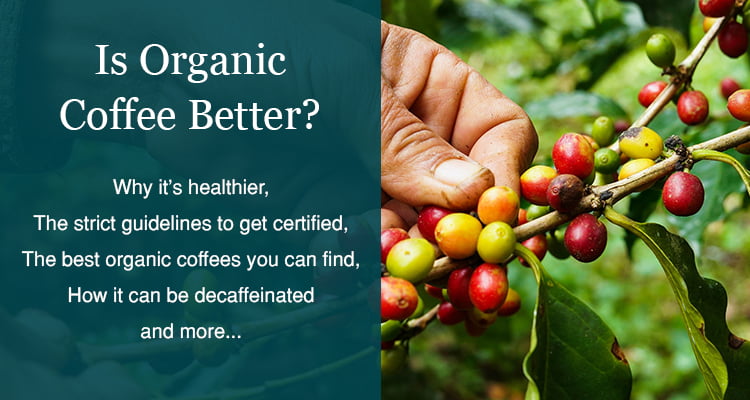Blog
Why Organic Coffee is Better
Organic coffee contains higher concentrations of vitamins and antioxidants than its non-organic counterpart. Furthermore, its lower chemical residue makes it safer for health-minded consumers.
Organic coffee beans are also low acidity, making it easier on both your stomach and digestive system – no more acid reflux or GERD for you!
It’s Better for the Environment
Organic farming is not just better for the environment; it is also much safer and healthier way to grow coffee. Conventional coffee farming relies on chemical pesticides, herbicides, and fungicides that leave hazardous residues on harvested beans; while organic coffee production relies on more natural methods like crop rotation, soil health management solutions and crop rotation for pest management.
Organic farming also benefits the environment by using less energy, fuel, and water resources in its cultivation process, helping reduce pollution emissions into the atmosphere while protecting local ecosystems from excessive exposure to synthetic fertilizers and pesticides.
Organic coffee producers take great care to minimize their environmental footprint through sustainable growing practices and certification standards that support organic agriculture. By forgoing chemical use altogether, their crops naturally absorb more nutrients from the soil resulting in superior tasting coffee with richer flavors than its conventional counterpart.
Organic farmers typically follow Fairtrade principles that promote sustainable and vibrant communities worldwide. Economic stability provided by these systems gives organic producers more reliable subsistence income while simultaneously encouraging indigenous cultural practices and agricultural traditions to continue flourishing.
Organic coffee is an eco-friendly drink that benefits both you and the planet, not to mention your body and community. Thanks to sustainable labor practices, reduced greenhouse gas emissions and potential wellness advantages it could only get better! So grab your favorite mug, brew up some organic coffee in it and help create a better world one cup at a time – your taste buds will thank you for it!
It’s Better for Your Health
Organic coffee cultivation methods do not use toxic chemical pesticides and fertilizers that pollute soil and water resources and could pose potential health risks when consumed directly by humans. Organic farming adheres to stringent standards which eliminate this threat, so there’s no risk of accidentally infusing yourself with potentially hazardous toxins from conventional farming practices in your morning cup of joe!
Organic coffee contains higher levels of natural antioxidants like chlorogenic acid that have been linked with improved metabolic functions and reduced risks of certain cancers, and may help lower blood pressure, strengthen immunity systems and decrease cholesterol levels.
Organic coffee production often uses shade growing techniques that protect and conserve biodiversity of forest ecosystems rather than destroy them for production of beans. Furthermore, chemical pesticides and herbicides lead to erosion which has detrimental impacts on water quality and availability; organic farming reduces exposure to these corrosive inputs which is ultimately more beneficial for soil health – thus making this type of farming better for our environment overall.
Organic coffee cultivation also benefits the farmers who cultivate it. Traditional agriculture involves using various synthetic herbicides, fungicides and insecticides that may contaminate workers and cause serious health problems over time. Organic farming eliminates all of these hazardous chemicals altogether for improved working conditions for growers as well as safer drinking habits for consumers in the long run.
Research may not prove it yet, but many find eating organic to bring greater peace of mind. By choosing organic products like coffee as we vote with our dollars for sustainable practices that prioritize ecosystem health over profits – creating a world which is both healthier and tastier!
It’s Better for the Farmers
As the largest coffee consumer, the United States offers an opportunity to help improve quality of life for coffee farmers and workers worldwide. By opting for organic coffee whenever available and advocating for its availability where not yet accessible, we can make an impactful difference in their lives that feed into our daily cup of Joe.
Organic farming techniques require farmers to rely on only natural fertilizers (like compost or chicken manure) and pest control measures instead of chemical sprays for pest control purposes, making their farms healthier places for workers while simultaneously decreasing soil contamination by toxic chemicals used on conventional crops.
Organic farms tend to use shade grown techniques, which helps preserve wildlife habitats while also improving soil health. Furthermore, forested farms tend to be more resilient against climate change effects and sequester more carbon in their soil than chemically farmed farms can.
Unffortuately, however, the benefits aren’t always enough to offset the additional costs associated with organic certification. Furthermore, most coffee is produced in developing nations where farmers often lack access to financial support; as a result many find it impractical or impossible to convert to organic production – especially small farms relying solely on coffee production as their only income stream.
Certified organic farmers must submit their crops for three years with a USDA-approved agency before they are certified, following stringent rules on which products they can use and how to grow the crop. This can be financially detrimental to small coffee farms; hence it’s imperative that customers purchase only organically certified coffee.
Organic coffee is often fair trade certified, which ensures farmers receive fair compensation and work in healthy and safe conditions. This is particularly helpful for family farms who can then reinvest in their community while continuing to produce high-quality organic coffee that benefits everyone. Plus, let’s face it: organically certified coffee simply tastes better! With richer textures and more complex flavor profiles compared with conventional options.
It’s Better for the Community
Organic coffee tends to be richer in antioxidants than non-organic varieties due to the fact that organic crops don’t receive pesticides and chemical fertilizers like conventional crops do. Furthermore, its certification process typically takes into account any plants and trees near coffee beans that add value by enriching soil by mulching leaves, branches and fruit into it; helping reduce soil erosion and depletion while at the same time increasing biodiversity and providing shade from harsh sunlight.
Organic coffee is beneficial not only for its producers but also you as it provides support to local economies in developing nations. Premium-priced organically-grown beans offer farmers more stable income from harvests. This is particularly crucial in regions with higher living costs and weak economies.
Many consumers also find organic coffee less acidic than its traditional varieties, making it easier on their stomach. This feature is particularly beneficial to those suffering from issues like GERD or acid reflux and can significantly enhance how much enjoyment is taken from their morning cup of joe.
Organic coffees are often grown organically within natural forests, helping preserve them while controlling pests and soil erosion while simultaneously conserving regional biodiversity. Conversely, conventional crops such as those produced through slash-and-burn methods often wreak havoc on both our environment and workers who harvest them.
When purchasing coffee, it’s essential that you opt for brands certified as organic and fair trade. Look out for the USDA organic seal to verify its organic status, and purchase it from companies dedicated to supporting farmers behind their products. With all of its positive influences on both our environment and health, organic coffee should definitely be given a chance!




